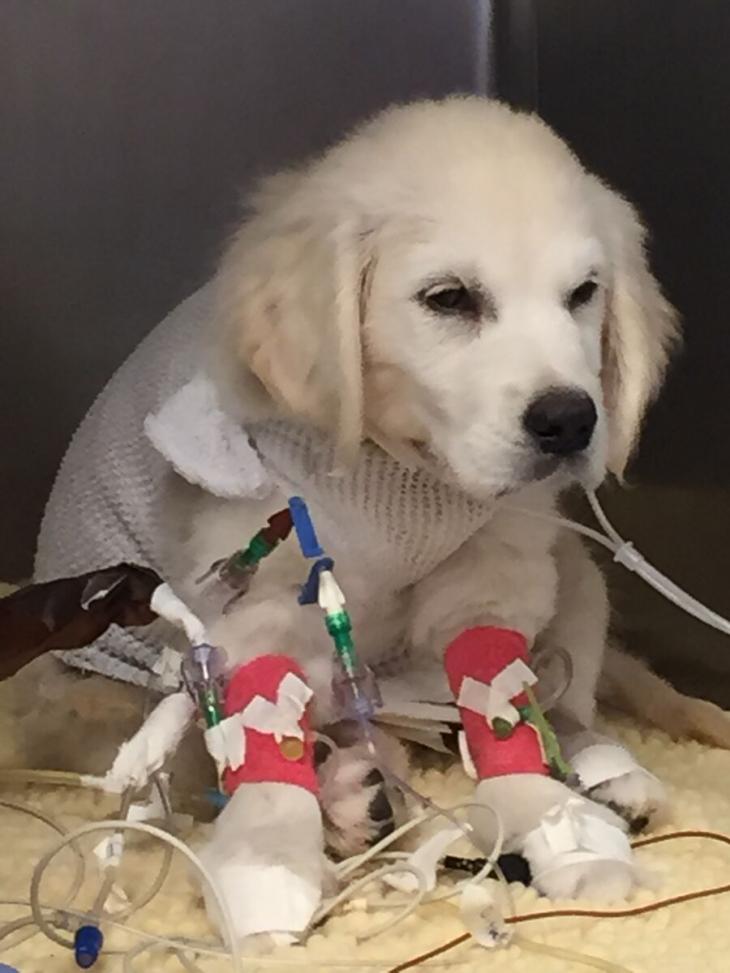
A second chance for Abby: Dialysis saves puppy
Thursday, August 13, 2015
Abby is an English Golden Retriever puppy. She came to live with her owners — the Ashcrafts of Edmond, Oklahoma — about 10 days before she became deathly ill.
“I noticed that Abby wasn’t eating and that she felt extremely warm,” Shasta Ashcraft said. “We took Abby to our normal vet, Britton Road Veterinary Clinic in Oklahoma City. They kept her through the day and monitored her. Her values weren’t right and her kidney function didn’t look good. They asked if I wanted to take her home for the night since nobody would be there with her 24/7. I was out of town and wasn’t comfortable with that so that evening, my mom actually drove to Oklahoma City, picked her up and then brought her to OSU.”
Dr. Lydia Gentry, with the Oklahoma State University Veterinary Medical Hospital’s emergency service, quickly diagnosed Abby with having elevated kidney values, which means her kidneys were not working properly. Abby was given IV fluids and some antibiotics knowing that leptospirosis was a concern for any patient with those symptoms. By morning, it was apparent that her kidneys had completely shut down and were no longer making urine.
“Abby was diagnosed with a bacterial infection called leptospirosis,” said Dr. Shane Lyon, assistant professor of small animal internal medicine at OSU. “Leptospirosis is a bacteria that is transmitted through the urine of infected animals, particularly rats, possums, raccoons, things like that in the environment. When dogs are exposed to the urine, this bacterial infection infects their bloodstream initially and then settles into their kidneys and causes kidney damage.”
With her kidneys not working, Abby’s body had no way to rid itself of toxins. Her team of veterinary specialists included Drs. Lyon and Kelly Sesemann in small animal internal medicine, Dr. Sabrina Reilly in anesthesia, Drs. Mark Rochat and Brandy Cichocki in small animal surgery, several veterinary technicians and assistants, and fourth year veterinary student, Rebecca Dallam.
“We used a specific kind of dialysis on Abby called peritoneal dialysis,” said Lyon. “We surgically placed a tube into her abdomen and infused sterile product into her abdomen. We allowed that to sit for a period of time using her body to draw out those toxins that should be removed from the kidneys and then removed that fluid from her abdomen. That cycle was repeated every hour for the first 24 hours.”
Abby went from making no urine, to making urine, to making too much urine. Housed in the hospital’s Kirkpatrick Foundation Small Animal Critical Care Unit, she received round-the-clock care for 14 days.
“One thing that I have been so happy with as a pet owner is just the attention to detail and the care and the true love that Abby has received,” Ashcraft said. “I have constantly received updates by phone in the mornings and in the evenings letting me know how things are going. I didn’t even know before I walked in this place that dogs could receive dialysis. The fact that they were willing to go the distance, as long as I was giving them permission to go the distance, should make anybody just say, 'This is the place I should go when I need help.’”
While only time will tell how much kidney damage was caused by the infection, Abby’s prognosis is good.
“Her prognosis at this point is pretty good to excellent,” Lyon said. “Her kidney values have pretty much normalized. I do think the only reason Abby was successful in her treatment was because of the team approach that we have at Oklahoma State. And that involves a lot of different people including really good, dedicated owners that were observant of their dog and brought her to her primary care veterinarian in a timely fashion.
"The primary care veterinarian, who recognized the severity of her disease and immediately referred her for further care. That care was continued by our emergency service and then by our internal medicine and surgery services for dialysis.”
Abby returned to the hospital on July 10 for a follow up visit and then again on July 23 for one more checkup.
“Abby is producing sufficient amounts of urine and her kidney enzymes have returned back to normal. We will just have to monitor those over time to see how much damage was done,” Lyon said.
Ashcraft said it is an amazing response from Abby.
“To bring her in the state that she was and then be able to pick her up and the progress that we’ve made in the last two weeks is just uncanny,” Ashcraft said. “It’s an amazing response to the way that she’s healed. And being a normal puppy, and running and jumping, being into everything and destroying everything, I just never thought we’d get back to this point.”
